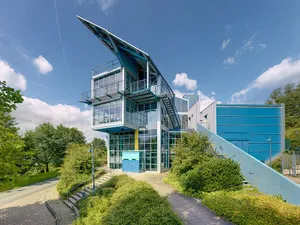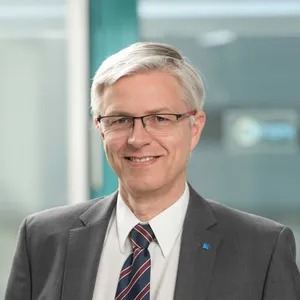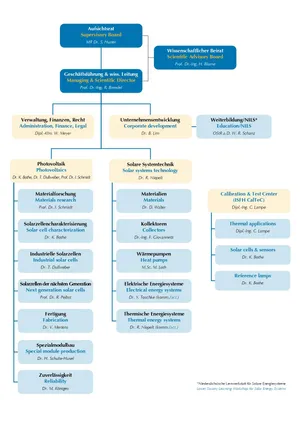
About our institute
Welcome to the Lower Saxony Institute for Solar Energy Research (ISFH)!
We conduct research to advance the use of solar energy. Our goal is to develop cost-effective, resource-efficient, recyclable, and EU-manufactured components for user-friendly and optimized energy systems. We support industry across the entire value chain—from materials to components to complete energy systems that generate heat and electricity according to demand. Why? Because knowledge of solar technology is a key factor in achieving geopolitical independence and increasingly offers opportunities for our economy. Solar energy is becoming the defining energy source for humanity and is urgently needed worldwide.
The Lower Saxony Institute for Solar Energy Research (ISFH) has made major contributions to the current state of solar technology and is one of the leading public research institutions in the field. Independent, publicly funded research combined with a creative environment of collaboration—particularly with Germany’s innovation-driven mechanical engineering sector and the technically focused Leibniz University Hannover—forms the basis of our strength. Our progress is driven by a deep scientific understanding of both the physics of solar components and the production processes and operation of complex energy systems.
International demand for solar energy and solar technology continues to rise. New photovoltaic manufacturing facilities are being established in countries such as India, the United States, and Turkey. This creates opportunities for us to share our expertise and European products abroad. With support from the State of Lower Saxony and the Federal Ministry for Economic Affairs and Energy, we are currently setting up a modern, digitalized research line for producing large-area silicon solar cells and specialized modules. This work lays the foundation for increased photovoltaic production and reduced CO₂ emissions in Europe.
We look forward to harnessing these bright opportunities and working with you to push the boundaries of what is possible.
Prof. Dr.-Ing. Rolf Brendel
Scientific Director and Managing Director

Departments at the ISFH
Photovoltaics
In photovoltaic research, the tasks include fundamental material examination as well as the development of processes and systems for the production of solar cells. The main focus is on the development of new silicon solar cells with efficiencies of more than 24%, highly efficient tandem solar cells and the associated PV module technology. The overriding aim is to reduce the production costs of solar cells and PV modules.
Solar systems technology
The Solar systems technology department focuses on the integrated overall energy supply of electricity and heat for decentralized units such as buildings and settlements. The objective is a cost-effective and low-CO₂ energy supply in high-quality systems. To this end, ISFH develops, evaluates and optimizes thermal solar collectors, heat pumps, innovative coating processes, storage concepts and new applications and combinations for energy systems.
CalTeC
The ISFH CalTeC (Calibration and Test Center) offers independent and accredited measurements for the calibration of silicon solar cells and for testing heat pumps, solar absorber coatings, spectroradiometers and solar thermal systems and components.
Central services
The Central services support the entire infrastructure of the institute. They consist of an administrative department, to which the secretariat, accounting, legal and human resources departments are assigned, and the corporate development department, which comprises the technical areas of building services, mechanical workshop and IT as well as public relations.
Organizational chart of the ISFH

Organizational chart
PDF, 56.86 KBMore information
Supervisory Board
The Supervisory Board appoints, controls and advises the Managing Director. According to the Institute’s statutes it consists of up to nine members. Some of the members are directly appointed by the State of Lower Saxony, the rest being elected by a shareholders’ general meeting. The Supervisory Board also regularly invites guests to its meetings who perform an advisory function.
The members of the Board are
- Dr. Sebastian Huster (Head of the Supervisory Board), Niedersächsisches Ministerium für Wissenschaft und Kultur, Hanover
- Jana Miksch (Deputy Head), Niedersächsisches Finanzministerium, Hanover
- Dirk Adomat, Landkreis Hameln-Pyrmont
- Dr. Anke Grieße, Niedersächsisches Ministerium für Umwelt, Energie, Bauen und Klimaschutz, Hanover
- Prof. Dr. Rolf Haug, Leibniz Universität Hannover, Hanover
- Prof. Dr. Bernd Rech, Helmholtz-Zentrum Berlin für Materialien und Energie, Berlin
- Martin Roßmann, Viessmann Holding International GmbH, Allendorf (Eder)
Scientific Advisory Board
The Scientific Board advises the Director and the Supervisory Board of the ISFH on all scientific, technical and organizational issues. Board members were nominated by the Lower Saxon Minister for Science and Culture. The Board members are respected scientists from universities and industry as well as other personalities who, through their professionals experience, are familiar with the research topics of the ISFH.
The members of the Scientific Advisory Board are
- Prof. Dr.-Ing. Holger Blume (Head of the Scientific Advisory Board), Leibniz University Hannover – Vice President for Research and Transfer, Hanover
- Dr. Jutta Trube, formerly VDMA (Deputy Head of the Scientific Advisory Board)
- Dr. Gunter Erfurt, formerly Meyer Burger Technology AG
- Prof. Dr.-Ing. Philipp Geyer, Leibniz University Hannover – Sustainable Building Systems, Hanover
- Dr. Michel Haller, SPF Institute for Solar Technology, OST, Eastern Switzerland University of Applied Sciences, Rapperswil, Switzerland
- Dr. Helge Haverkamp, centrotherm international AG, Blaubeuren
- Dr. Winfried Hoffmann, ASE, Hanau
- Prof. Dr.-Ing. Katharina Klemt-Albert, RWTH Aachen University – Institute of Construction Management, Digital Engineering and Robotics in Construction, Aachen
- Dipl.-Ing. Gerald Müller, Viessmann Holding International GmbH, Allendorf (Eder)
- Dr. Delfina Muñoz, National Institute for Solar Energy (INES), Le Bourget du Lac, France
- Dr. Lars Oberbeck, Total S. A., Paris, France
- Prof. Dr.-Ing. Annika Raatz, Leibniz University Hannover – Institute for Assembly Technology, Hanover
- Dr. Kai Schiefelbein, Stiebel-Eltron GmbH & Co. KG, Holzminden
- Prof. Dr. Frithjof Staiß, Zentrum für Sonnenenergie- und Wasserstoff-Forschung Baden-Württemberg (ZSW), Stuttgart
- Prof. Dr. Arthur Weeber, TU Delft, Netherlands
Do you have any questions?
You are welcome to contact us. We look forward to hearing from you!

How to get to the ISFH
By public transport
From Hameln train station, take bus 40 or 522 to Ohrbergpark
By car
Via federal highway 83, junction ‘Am Ohrberg’
between Hameln and Emmerthal
%20JAB%202018.png-300w.webp)